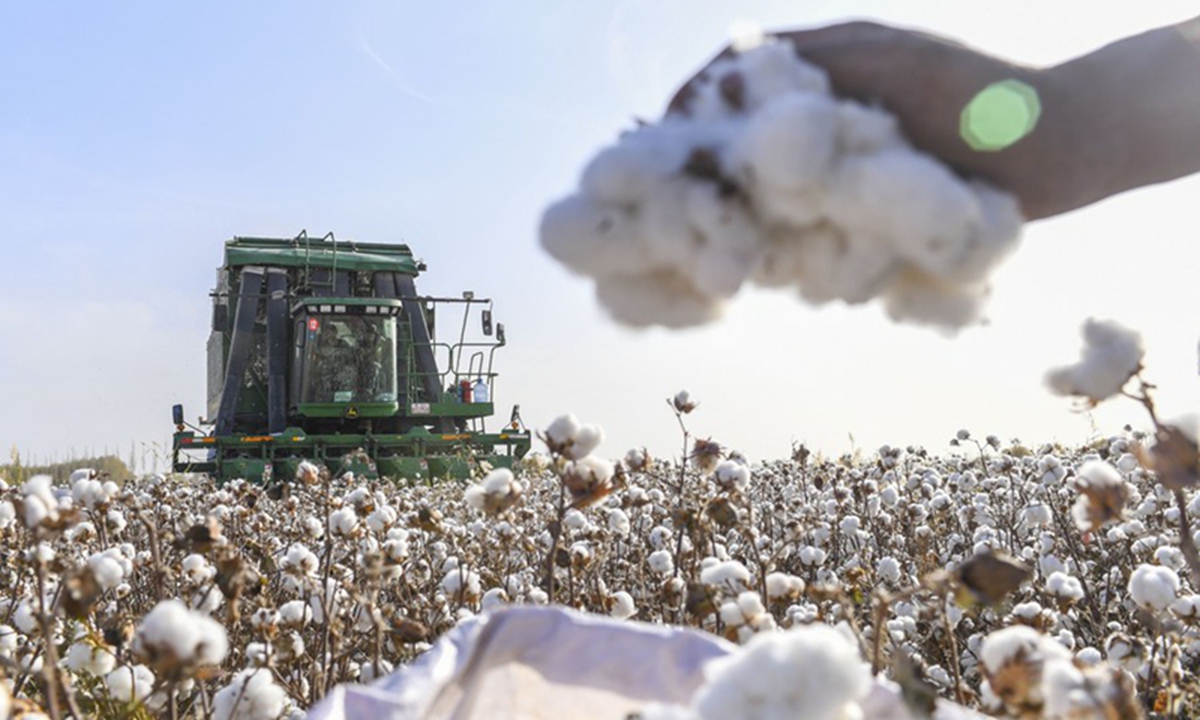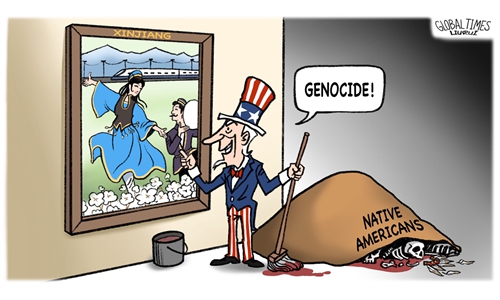
File photo: Xinhua
A US legislation banning imports from Northwest China's Xinjiang Uygur Autonomous Region took effect on Tuesday. The ban takes a "rebuttable presumption" that all goods from Xinjiang were made using forced labor, and goods from Xinjiang can be imported to the US only if companies can prove that their supply chains are free of the involvement of forced labor. This is a serious escalation in the US' campaign to contain China that calls for serious countermeasures.The so-called forced labor claims about Xinjiang are utter lies concocted by the US. So the US ban, based on lies, is actually aimed at impeding the rapid economic development in Xinjiang by cracking down Xinjiang's core industries, including cotton, tomatoes, and polysilicon, and by seeking to completely exclude the region from the global supply chain.
Given the past experience of US unilateral sanctions, the move over Xinjiang will only create new chaos for an already troubled world economy. Take Xinjiang cotton as an example. The US already banned the entry of all products using cotton from Xinjiang early last year. The ban has exacerbated global supply chain problems for cotton products, pushing up cotton prices to almost double from the 2020 levels, clobbering the downstream textile industries in Asia and also to the detriment of the US' own efforts to curb inflation.
In addition to cotton, nearly 50 percent of the world's polysilicon comes from Xinjiang. Also, a significant proportion of China's tomatoes are grown in Xinjiang. China supplied about 62.76 million tons of tomatoes in 2019, accounting for about 35 percent of global production. Thus, the ban that came into effect on Tuesday will undoubtedly further disrupt international trade order and destabilize global industrial and supply chains.
It is worth noting that while the impact of the US ban on Xinjiang goods can be largely digested by China's massive domestic market, the malicious attempt by Washington to squeeze Chinese manufacturing out of global industrial chains by imposing sanctions on Xinjiang calls for increased vigilance against the US' intensifying and broadening efforts against China.
For example, the cotton issue is not just crucial to Xinjiang's economic development, but can also be seen as part of the US' strategic containment of China. This is because textile products have long been a mainstay of the Chinese exports. As the world's second-largest cotton producer, China produced 5.95 million tons of cotton in 2020. Xinjiang is China's largest cotton production area, with output reaching 5.16 million tons in 2020, accounting for 87.3 percent of the country's total output. To a certain extent, the US ban is not just targeting Xinjiang cotton, but the textile industry in China.
In light of the fresh escalation by the US, China needs to prepare and take all necessary measures to strike back at the US and safeguard its national interests.
There are many ways China can make its opposition to the vicious bill clear to the US, including reciprocating measures against the US. There are numerous areas where the US relies heavily on Chinese products and market.
Also, businesses that follow the US' order and harm Chinese interests could face serious consequences in the Chinese market, as some foreign brands have experienced before as they faced serious backlash from Chinese consumers for banning Xinjiang products.
To protect local industries, China also needs to promote the industrial upgrading, manufacturing development and exports in Xinjiang to increase the region's appeal to companies.
More favorable policies are essential to support investment aimed at transferring production lines to Xinjiang, encourage trade between Xinjiang and surrounding areas, build a more stable trade network, and boost the manufacturing sector in Xinjiang. Favorable policies should be given to companies that use Xinjiang products, including multinationals, as a form of encouragement.
With the latest ban, the US has once again grossly overestimated its power in reshaping global supply chains and its ability to fight against economic trends. The rise of Xinjiang's industries and products globally was not because the US allowed, and it will not fall just because the US bans it.
With its ever-expanding bans and restrictions on businesses and products from an increasing number of countries and regions across the world, the US is the one that will be increasingly despised, abandoned and isolated in the global economy because it is becoming a major threat to global supply chains.



